外研八下英语M1U2微课精讲+知识点导学
Module 2课文知识点总结(含语法)-外研版八年级下册英语

2021~2022学年新课标外研版初中英语学习讲义八年级下学期Module 2课文知识点总结笔记Module 2 Experiences语法: 现在完成时(一)一、用法:(1)表示以前某个时间已经发生的动作或做过的事情对现在有影响 Eg: I have seen the film. 我已经看过这部电影了。
(强调电影的内容已经知道)(2)表示到目前为止已经完成的事。
Eg: My sister has learnt English for 3 years. 我的妹妹已经学英语三年了。
二、构成:主语 + have/ has + 动词过去分词三、各种句式肯定句:主语 + have/ has + 过去分词 + 其它Eg: I have watched the match.否定句:主语 + have/ has not + 过去分词 + 其它Eg: I haven’t watched the match.一般疑问句:Have/ Has + 主语 + 过去分词 + 其它肯定回答: Yes, 主语 + have/ has.否定回答: No, 主语 + haven’t/ hasn’t.Eg: Have you watched the match ?Yes, I have./ No, I haven’t.四、动词过去分词的构成:规则动词变化1.大多数动词后直接加ed:work → worked; cook → cooked2.以e结尾的动词加d:lived → lived; like→ liked3.以辅音加y结尾将y变成i加ed:try → tried; study → studied4.在重读闭音节中,双写结尾加ed: stop → stopped; plan → planned5.不规则变化:见教材126页表格1.experience ( Cn.) 经历Eg: Please tell me about your experience in Africa.experience (Un) 经验Eg: Miss Li has 30 years’ teaching exper ience.2.enter a competition 参加比赛enter = take part in 参加;进入3.what kind of …什么种类kind (n.) 种类 all kinds of 各种各样的; a kind of 一种; different kinds of 不同种类的;kind of 有点;kind (adj.) 善良的 Eg: He is a kind boy.4.speaking competition 演讲比赛5.improve speaking 提高口语6.maybe (adv.) “也许;大概”may be 情态动词 + Be动词“也许是;可能是”Eg: She may be angry.= Maybe she is angry.7.win a prize 获奖beat “打败”后接对手或团队等win “赢得”后接比赛、奖品等8.the first prize 一等奖9.dream (n.) 梦寐以求的人或事Eg: That’s my dream s chool.dream “梦;梦想”Eg: My dream is to be a pilot.(v.) 梦到;梦想dream of/ about …“梦见… ”后接名词、代词或动名词Eg: I dream of/ about flying in space.10.ever (adv.) “曾经;从未”用于现在完成时的一般疑问句中,加强语气“Have/ Has sb. ever + 过去分词 + 其它?”用于询问某人是否做过某事11.before(adv.) “以前”与现在完成时连用,也可用于一般过去时中,位于句末。
外研版八年级英语下册Module 2知识点总结
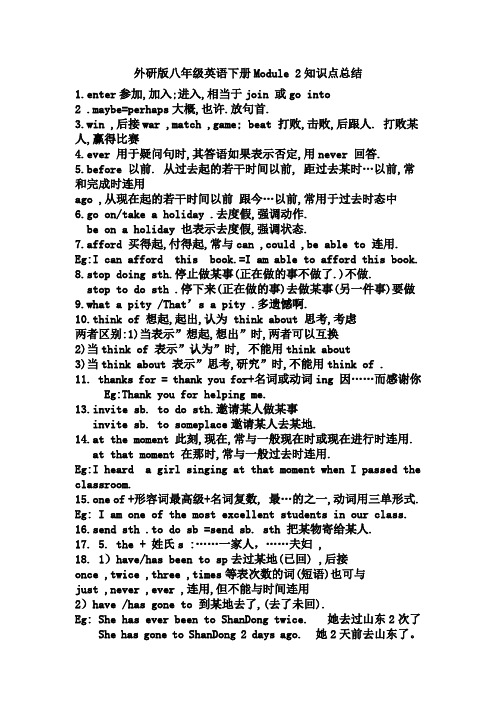
外研版八年级英语下册Module 2知识点总结1.enter参加,加入;进入,相当于join 或go into2 .maybe=perhaps大概,也许.放句首.3.win ,后接war ,match ,game; beat 打败,击败,后跟人. 打败某人,赢得比赛4.ever 用于疑问句时,其答语如果表示否定,用never 回答.5.before 以前. 从过去起的若干时间以前, 距过去某时…以前,常和完成时连用ago ,从现在起的若干时间以前跟今…以前,常用于过去时态中6.go on/take a holiday .去度假,强调动作.be on a holiday 也表示去度假,强调状态.7.afford 买得起,付得起,常与can ,could ,be able to 连用. Eg:I can afford this book.=I am able to afford this book.8.stop doing sth.停止做某事(正在做的事不做了.)不做.stop to do sth .停下来(正在做的事)去做某事(另一件事)要做9.what a pity /That’s a pity .多遗憾啊.10.think of 想起,起出,认为 think about 思考,考虑两者区别:1)当表示”想起,想出”时,两者可以互换2)当think of 表示”认为”时, 不能用think about3)当think about 表示”思考,研究”时,不能用think of .11. thanks for = thank you for+名词或动词ing 因……而感谢你 Eg:Thank you for helping me.13.invite sb. to do sth.邀请某人做某事invite sb. to someplace邀请某人去某地.14.at the moment 此刻,现在,常与一般现在时或现在进行时连用. at that moment 在那时,常与一般过去时连用.Eg:I heard a girl singing at that moment when I passed the classroom.15.one of +形容词最高级+名词复数, 最…的之一,动词用三单形式. Eg: I am one of the most excellent students in our class.16.send sth .to do sb =send sb. sth 把某物寄给某人.17. 5. the + 姓氏s :……一家人,……夫妇 ,18. 1)have/has been to sp去过某地(已回) ,后接once ,twice ,three ,times等表次数的词(短语)也可与just ,never ,ever ,连用,但不能与时间连用2)have /has gone to 到某地去了,(去了未回).Eg: She has ever been to ShanDong twice. 她去过山东2次了 She has gone to ShanDong 2 days ago. 她2天前去山东了。
外研版英语八年级下册Module2课文+知识点
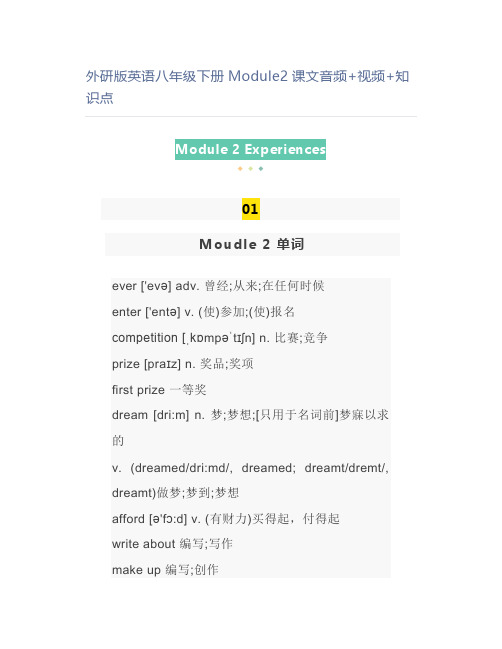
外研版英语八年级下册Module2课文音频+视频+知识点◆◆◆01Moudle 2 单词ever ['evə] adv. 曾经;从来;在任何时候enter ['entə] v. (使)参加;(使)报名competition [ˌkɒmpəˈtɪʃn] n. 比赛;竞争prize [praɪz] n. 奖品;奖项first prize 一等奖dream [dri:m] n. 梦;梦想;[只用于名词前]梦寐以求的v. (dreamed/dri:md/, dreamed; dreamt/dremt/,dreamt)做梦;梦到;梦想afford [ə'fɔ:d] v. (有财力)买得起,付得起write about 编写;写作make up 编写;创作invite [ɪn'vaɪt] v. 邀请move [mu:v] v. 搬家;改变…的位置send [send] v.(sent/sent/, sent) 派遣去;命令……去Germany [ˈdʒɜ:məni:] n. 德国France [frɑ:ns] n. 法国tower ['taʊə] n. 塔ancient ['eɪnʃənt] adj. 古老的;古代的king [kɪŋ] n. 国王;君王queen [kwi:n] n. 女王;王后Arabic [ˈærəbɪk] n. 阿拉伯语way [weɪ] n. 方面; 态度mix [mɪks] v. 相混合;融合miss [mɪs] v. 惦念;怀念;想念count [kaʊnt] v. 数;清点count down 倒数;倒计时M2U1课文动画M2U2课文动画02电子课本03Moudle 2知识梳理【重点单词学习】1. experience n. 经验(不可数),经历(可数)【例句】She has little experience because she has worked for only one month.He had many interesting experiences while travelling in Africa.[考题链接]Mr. Guo is a teacher of much teaching__________(经验).【用法】用作动词,表示“体验”“经历”等。
(完整word版)外研社八年级英语下Module2知识点,文档.doc

八年级下 Module 2 Feelings and impressions 知识点Unit 11、 pity同情,可惜的事,憾事,怜eg. It is a that you did not come with us .What a! 多么可惜啊!2、 Have you ever entered a competition?eg. (1) enter 名参加------ take part in = joinjoin 参加,体take part in 参加活He他参加多比。
(2) competition/ game/matchcompetition ,比 (技巧,体力,知等方面 )match 指重要的,参加数多的大型比(与 game 可以互 ) ,game 决定的游eg. All the 28th Olympic the Chinese team got 32 gold medals.We had a volleyball on the playground .I have entered an English.Sporting is different from other kinds .(3)before: 作副,“以前”常与在完成用,表示“从在开始追溯到去的一段” ;作介,“在⋯⋯之前”;ago 常与一般去用,不能与在完成用。
I came here a year.He has never seen such a huge stone.My father usually goes to bed9:00 pm .3、 prize n. ;利品;得努力争取的西eg. Winners usually get a.者通常会有一个品。
4、 dream vi. 梦想,做梦,梦,想到1(1) dream of / about梦见(2) have a dream做梦,有一个梦想(3)achieve one’s dream 实现梦想eg. He Claire . 他梦见了克莱尔。
外研版八年级英语下册Module 1Unit 2 教学导案含答案

Unit 2 I feel nervous when I speak Chinese一.学习目标:1. Learn to impress what you look like.2. Describe yourself.二.课前朗读(朗读与本课有关的单词)三.学习过程1. 导入:1)Work in pairs. Look at the two photos. Talk about how they look.Use the words in the box to help you.She’s tall with long hair.She looks friendly.dark fair glasses long old pretty short tall young 2) Now describe people in your class.2. 1) Listen to the tape about Sally’s letter and find out which is her photo.2) Listen again and answer the following questions.1> What do you look like?2> What do you like doing?3. 1)Read this letter and find out all the sentences about 感管动词。
2)Read again and answer the questions.How does Sally feel when she……1> gets bad marks at school?2> leaves her mum and dad?3> is with strangers?4> speaks Chinese?5> does something wrong?6> flies?3) 默读整篇文章,找出下列词组。
外研初二下M1U2

In senior high school David wrote a story about teenage life, and it came out as a book in 2003. Many teenagers love his book, and as a result, David has become a successful young writer.
such as 比如 work shop 讨论会 professional 职业的,专业的 imagine 想象,设想 senior 高中 teenage 十几岁(13へ19岁) 的 teenager 十几岁的青少年
such as比如;例如 比如; 比如 【经典例句】 English is spoken in many countries,such as Australia and Canada. 许多国家都讲英语,例如澳大利亚和加拿大。 【考点聚焦】 such as & for example for example通常与所给的例句用逗号隔开, 只列出一项,后面的例子通常是句子.可位 于句首、句中或句末。 such as用来列举事物时,列举同类人或事物 中的几个例子,一般至少有两项。such as 后面则常接名词性的短语。
creative adj.有创造性的 有创造性的 【巧记提示】 create (v.创造;创作) +-ive. (形容词后缀) 【经典例句】 Human beings are creative animals. 人类是有创造力的动物。 【考点聚焦】 1)扩展词:create v.创造; 创作
useful 有用的 develop 发展,发达,进步 skill 技能,技巧 camp 营地,野营;帐篷 露营,野营 as well as 并且,还 activity 活动;行动
外研社八下M1U2I feel nervous when I speak Chinese知识点讲解

Module1unit2I feel nervous when I speak Chinese.重点知识讲解1.message / 'mesɪdʒ/ n.电子邮件;口信;信息message为可数名词,常见短语归纳:get/receive message收到信息leave a message留言send a message发送信息have /leave a message传口信2.can't wait 迫不及待can't wait to do sth.意为“迫不及待地干某事”。
Millie said she_____________(等不及看)her computer.It's a present from her parents.(连云港)3.(高频)wear/weə/v.穿;戴【辨析】wear,put on,have...on与dress一语辨异:Put on more clothes,and don't always wear/have on that coat.You should also learn to dress yourself.多穿点衣服,不要总是穿那一件外套。
你还应该学会给自己穿衣服4.spend/spend/v.花费【重点】“花费”的不同。
1)+spend++on sth./(in)doing sth.eg:I spend lots of time on football/(in)playing football.我在足球/踢足球上花费了许多时间。
2)pay++for sth.eg:I paid 100 yuan for this dress. 我买这件连衣裙用了100元。
(3)sth.+cost++eg:The book cost me ten yuan. 这本书花费了我10元。
(4)It takes+++to do sth.eg:It takes me half an hour to go to school.去学校花费我半小时。
Module 2 Unit 1 知识点详解-外研版八年级下册英语
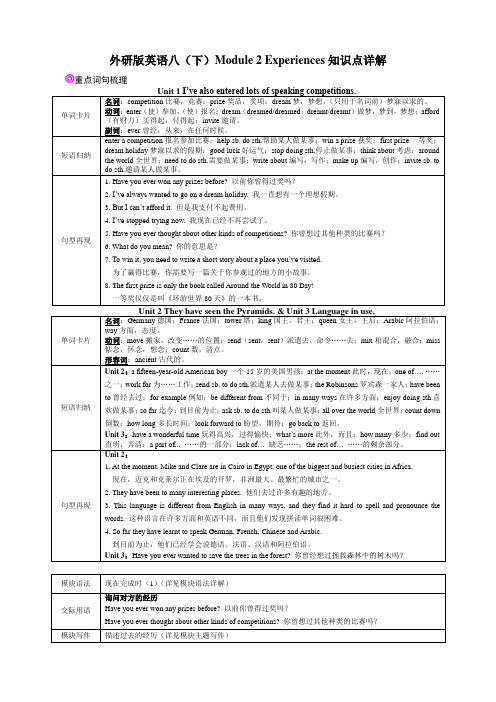
外研版英语八(下)Module 2 Experiences知识点详解Unit 1 I’ve also entered lots of sp eaking competitions.★(A3).【知识点再现】I am entering a competition. 我正参加一个比赛。
【知识点1】enter = take part in = join in意为“参加,报名”;enter = come/go into还有“进入”之意。
如:Several of the world’s finest runners have entered the race. 几名世界最优秀的运动员已报名参加比赛。
The thieves entered the building by the back door. 小偷从后门进入大楼。
★(A3).【知识点再现】It’ll help you improve your speaking. 那将帮助你提高英语水平。
【知识点2】help sb. (to) do sth. 意为“帮助某人做某事”,(to) do sth.在句中作宾补;help sb. with sth. 意为“在某方面帮助某人”。
两者可互换。
如:I often help him cook the meal. →I often help him with the meal. 我经常帮他做饭。
I often help him (to) learn English. →I often help him with his English. 我经常帮助他学英语。
★(A3).【知识点再现】And maybe you will win a prize. 或许你可以得个奖。
【知识点3】【辨析】maybe 与may be的用法辨析:①maybe是副词,意为“也许;大概”,在句中作状语,相当于perhaps,常位于句首,表示推测。
如:Maybe he is a student. 也许他是一个学生。
外研社八年级下册Module2unit1---unit2 同步知识点复习总结
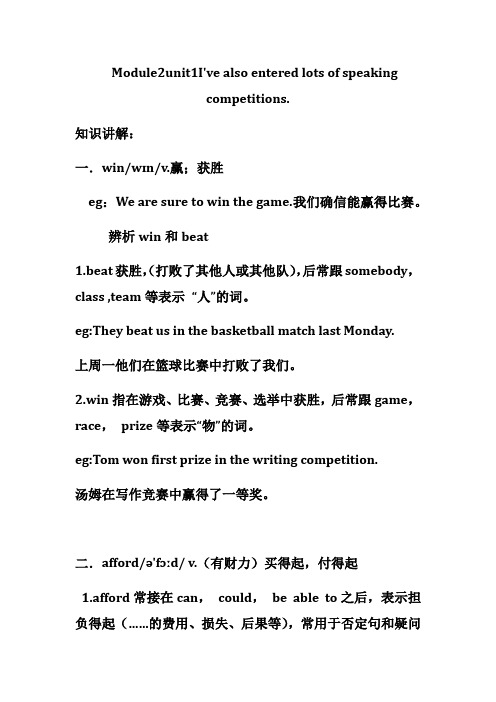
Module2unit1I've also entered lots of speakingcompetitions.知识讲解:一.win/wɪn/v.赢;获胜eg:We are sure to win the game.我们确信能赢得比赛。
辨析win和beat1.beat获胜,(打败了其他人或其他队),后常跟somebody,class ,team等表示“人”的词。
eg:They beat us in the basketball match last Monday.上周一他们在篮球比赛中打败了我们。
2.win指在游戏、比赛、竞赛、选举中获胜,后常跟game,race,prize等表示“物”的词。
eg:Tom won first prize in the writing competition.汤姆在写作竞赛中赢得了一等奖。
二.afford/ə'fɔːd/ v.(有财力)买得起,付得起1.afford常接在can,could,be able to之后,表示担负得起(……的费用、损失、后果等),常用于否定句和疑问句中。
Eg:Many people can't afford a new house now.现在许多人买不起新房子。
2.afford 后面可以接名词、代词或动词不定式作宾语。
eg:The family could not afford to send her to college.家里没有足够的钱供她上大学。
3.afford 后面可以接双宾语,即afford sb.sth.“为某人提供某物”。
eg:Reading will afford you much pleasure.阅读会给你提供很多乐趣。
三.invite/ɪn'vaɪt/v.邀请Did Jim invite you last night?昨晚吉姆邀请你了吗?1. invite sb.to do sth.邀请某人做某事eg:He invited Mary to have dinner.他邀请玛丽吃晚餐。
外研版八年级英语下册Module 1--2 知识点汇总

天津市武清区外研版八年级英语下册Module 1 知识点汇总Unit 1 It smells delicious.重点短语和句型:1. a bit sour 有点儿酸2. be done 做好了,完成了3. have a try 试试看,尝一尝4. on top 在顶端,在上边5. in the middle 在中间6. lots of 许多7. sweet tooth 对甜食的爱好8. be sure 确信,相信9. strawberry jam 草莓酱10. my lucky day 我的幸运日11 What a delicious smell! 多好闻呀?12. Would you like to try some? 你想尝一些吗?13. It doesn't smell fresh. 它闻起来不新鲜了。
14. It smells too strong. 它闻起来气味太浓了。
15. I have a sweet tooth. 我是个甜食爱好者。
16. Shall I get the sugar? 我来拿糖吧?17. It might be salt. 它可能是盐。
18. Dried fish has a strong taste. You don't need much of it in the dish.鱼干粉有很浓的味道。
你不需要在菜里放很多。
19. The milk has gone sour overnight, so we can't drink it.隔夜的牛奶已经变酸了,所以我们不能喝了。
Unit 2 I feel nervous when I speak Chinese.1. hear from 收到某人的来信2. can't wait to do 等不及做某事3. arrive at the airport 到达飞机场4. wear glasses 戴着眼镜5. have got 有6. each other 彼此,互相7. sound like 听起来像.....8. spend... doing 花费...做某事9. play classical music 演奏古典音乐10. dance music 舞蹈音乐11. at school 在学校,上学12. as well 也13. be proud o 为...而感到骄傲14. be good at 擅长....15. feel a bit sad 觉得有点儿伤心16. for a few days 连续几天17. in a few days 几天之后18. in the right way用正确的方式19. be afraid of doing 害怕做某事20. be excited about对... 感到兴奋21. at first 起初,开始22.Thanks for your last message. 谢谢你的上一封邮件23.Thanks for telling me about your hobbies. 谢谢你告诉我你的爱好。
英语八年级下册M1U2知识点

英语八年级下册M1U2知识点本篇文章主要介绍英语八年级下册第一单元第二课的知识点。
这节课主要涉及到四个方面的内容,分别是“谈论爱好”,“谈论偏好”,“游戏规则”和“接受邀请”。
以下将分别介绍这四个方面的知识点。
谈论爱好当我们想要和别人分享自己的爱好的时候,可以说“I love…”或者“I’m interested in…”。
例如,“I love playing basketball.”或者“I’m interested in reading books.”此外,我们还可以使用动词+ing的形式来表达我们正在做的事情,例如“I’m playing football.”或者“I’m reading a book.”谈论偏好当我们想要表达自己对两个或者多个事物偏好的时候,可以使用“prefer”来表达。
例如,“I prefer playing basketball to playing football.”或者“I prefer reading books to watching TV.”在表达偏好的时候,我们还可以使用“like…better than…”的结构,例如“I like playing basketball better than playing football.”游戏规则当我们玩游戏的时候,需要遵守游戏的规则。
在英语中,我们可以说“Let’s read the rules.”或者“What are the rules?”来询问游戏的规则。
在解释游戏规则的时候,需要使用祈使句式,例如“Roll the dice.”或者“Move your piece to the next square.”接受邀请当我们接受别人的邀请的时候,可以使用“Sure.”来表示同意。
例如,“Do you want to play basketball with us?”“Sure.”此外,我们还可以使用“Why not?”来表示同意。
外研版八年级下册Modules1_2英语总复习教材知识梳理篇及精讲试题-word
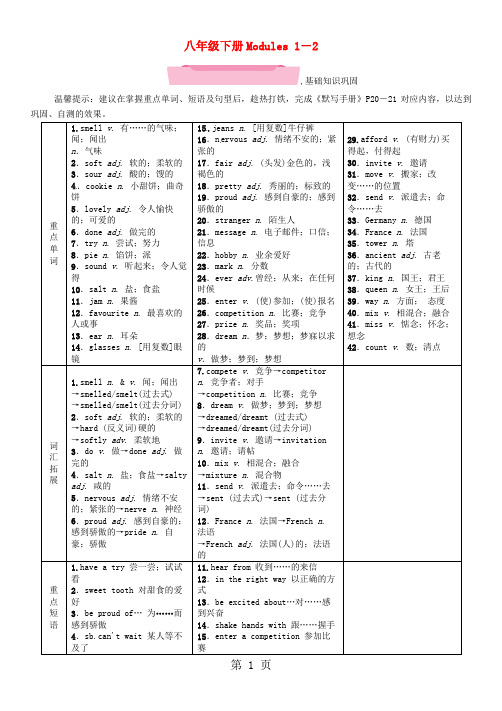
八年级下册Modules 1-2,基础知识巩固温馨提示:建议在掌握重点单词、短语及句型后,趁热打铁,完成《默写手册》P20-21对应内容,以达到巩固、自测的效果。
415.ervous续表befo re? n to many interesting ,重难词句选析1.smell v . 有……的气味;闻;闻出(教材P2) 【点拨】(1)smell 用作连系动词,意为“发出……气味;闻起来”,一般不用于被动语态和进行时态。
但有时态变化,过去式是smelt/smelled ,过去分词是smelt/smelled 。
常见结构为:“主语+smell +形容词”或“主语+smell +of +名词”。
如:This blue rose smells very sweet.这支蓝玫瑰闻起来很香。
The water smelt of earth.水闻起来有泥土味。
(2)smell 还可用作实义动词,意为“闻到”,后可直接接宾语,也可以接复合宾语。
如: I smelt something burning.我闻到了东西烧焦的味道。
【拓展】相似用法还有feel(感觉,摸起来),taste(品尝,尝起来),sound(听起来),look(看起来)这些动词。
【即时训练】第(1)题根据汉语意思完成句子;第(2)题根据汉语提示补全句子。
(1)这瓶牛奶闻起来有点酸。
The bottle of milk __smelt__ a little __sour__.(2)These clothes look __good__(好)and sell __well__(好). 2. afford v . (有财力)买得起,付得起(教材P10)【点拨】afford 常与can ,could ,be able to 连用,意为“负担得起(费用);经受得住(损失、后果);抽得出(时间)”。
后面一般接名词、代词或不定式,多用于否定句或疑问句中。
外研八下英语M10U2微课精讲+知识点总结+教案

重点句子1.The radio manager looked down at me.播音主任低着头看着我。
look down at...低着头看......2.Shouldn\\'t you be at school?难道你不上学吗?这是否定形式的一般疑问句,回答时yes和no的汉语意思相反。
Doesn\\'t he go to school by bike every day? Yes(不),he does. No(是),he doesn\\'t.3.I have always loved the radio.我一直喜欢播音。
always 总是;一直,副词,用于现在完成时态中表示强烈的感情色彩。
I have always wanted to go on a dream holiday.4....I sat close to the radio in the living room, listening to my favourite programmes and to the voices of my favourite presenters.......我紧挨着客厅的收音机坐着,听我最喜欢的节目和最喜欢的主持人的声音。
(1)close to...靠近......(2)in theliving room 在客厅(3)listening to my...是现在分词短语作状语,表示伴随。
She entered the classroom, carrying two books in her hand.5.It seemed that they were speaking not to lots of listeners but to me in person.我感觉好像他们不是在和听众说话,而是在亲自和我说话。
(1)It seems/seemed (to sb.) that+句子,(在某人看来)看起来似乎......It seems(to me)that she is very happy today.(2)not...but... 不是......而是...... Li Lanjuan is not a teacher but a doctor.(3)in person 亲自;本人6.At the age of nine, I asked for part-time jobs in smallradio stations.九岁时,我去小电台找个兼职工作。
英语八下外研版Module1Unit2讲学稿

英语八下外研版Module 1:Unit 2讲学稿Module 1 HobbiesUnit 2 Hobbies can make you grow as a person.学习目标:1.谈谈你有什么特别的爱好?你的父母、亲友、同学又如何?2.试举例说明同学的爱好。
3.运用“w”开头的疑问词及how进行问答。
达标:1.熟记Unit 1的单词;2.掌握重点短语的运用。
重点:1. look after保管、照顾你必须好好保管你的东西。
You must look after your things .2. help sb do sth 帮……做……help sb with sth女孩子经常帮妈妈做家务。
The girl often helps her mother do her housework .The girl often helps her mother with her housework .3. as well as 也、并且、还I’m learning French as well as English.4. such as 例如In the park there are many animals such as horses,monkeys and sheep.5. as a result 结果The boy got up late, as a result he was late for school .6. ask sb to do sth叫…….做…….The teacher asks us to come back to school on February 27th ,2022. 7. come out出版、出现、传出、结果是(P136⑤)The book came out last month .His dreams came out .The flowers come out in spring . 春天花儿开放。
外研版八下英语M1U2 语法课件

I paid 100 yuan for the gift .
6、I enjoy sports as well, especially tennis. 我也喜欢运动,尤其是网球。
拓展:too, as well,also, either ①too /as well 表示“也”常用于口语中,多用于肯定句句末,too 还可用于一般 疑问句。 ➢ Tom也喜欢阅读。
Life is not always fair.
(3)wear及物动词 “ 穿;戴”
拓展 wear,dress,put on ,(be)in ,have...on ①wear“ 穿;戴”,强调状态,宾语:衣帽、鞋袜、饰品、奖章等 ➢ Tom戴眼镜。
Tom wears glasses. ②dress “给某人穿衣服” 强调动作,宾语:人 dress oneself/get dressed等 ➢ 他太小还不会自己穿衣服。
外研版八年级下册 Module1 Unit2课文语法点
1.Thanks for your last message.谢谢你的上一封电子邮件。
(1)thanks for.... “因……而感谢你” for+名词/V-ing形式,表示感谢的原因,相当于thank you for...
thanks for sth./doing sth.=thank you for sth./doing sth. 例句: ➢ 谢谢你寄给我的照片。
Tom likes reading, too.
Tom likes reading as well . ②also 表示“也” 一般用于肯定句,
位于实义动词之前,助动词、be动词、情态动词之后。 ➢ 他也会说英语。
最新外研版英语八年级下册Module 2知识点总结
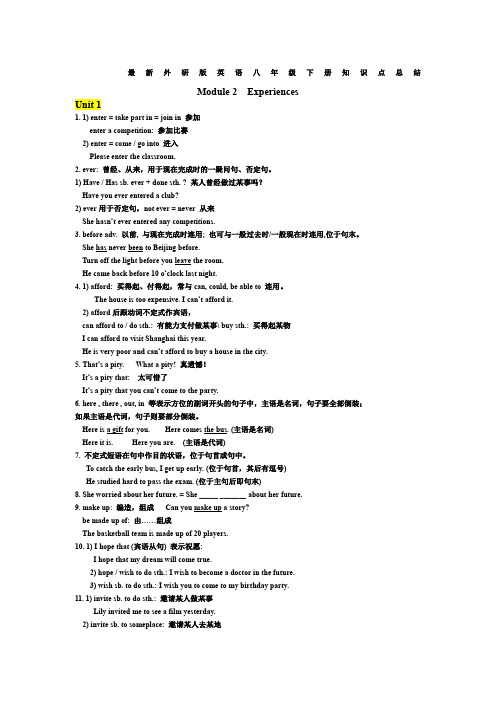
最新外研版英语八年级下册知识点总结Module 2 ExperiencesUnit 11. 1) enter = take part in = join in 参加enter a competition: 参加比赛2) enter = come / go into 进入Please enter the classroom.2. ever: 曾经、从来,用于现在完成时的一疑问句、否定句。
1) Have / Has sb. ever + done sth. ? 某人曾经做过某事吗?Have you ever entered a club?2) ever用于否定句,not ever = never 从来She hasn’t ever entered any competitions.3. before adv. 以前, 与现在完成时连用; 也可与一般过去时/一般现在时连用,位于句末。
She has never been to Beijing before.Turn off the light before you leave the room.He came back before 10 o’clock last night.4. 1) afford: 买得起、付得起,常与can, could, be able to 连用。
The house is too expensive. I can’t afford it.2) afford后跟动词不定式作宾语,can afford to / do sth.: 有能力支付做某事\ buy sth.: 买得起某物I can afford to visit Shanghai this year.He is very poor and can’t afford to buy a house in the city.5. That’s a pity. What a pity! 真遗憾!It’s a pity that: 太可惜了It’s a pity that you can’t come to the party.6. here , there , out, in 等表示方位的副词开头的句子中,主语是名词,句子要全部倒装;如果主语是代词,句子则要部分倒装。
外研版初中八年级下册英语精品词汇微课 Module 2 Unit 1

讲解:
make up意为“编写;创作”,为“动 词+副词”型短语。当代词作其宾语 时,代词只能放在make与up之间。
编写;创作
例句:
◆ Mike made up a song about them. = Mike made a song up about them.
拓展: make up还可以表示“组成;构成”。
Module 2 Experiences
Unit 1 I’ve also entered lots of speaking competitions.
外研·八年级下册
讲解:
(1) ever 意为“从来”,常用于现在完成时的 句子中,位于助动词和过去分词之间,多用 于否定句中,not… ever相当于never。 (2) ever 意为“曾经”,常用于现在完成时的 一般疑问句中,位于主语和过去分词之间, 用于加强语气。 (3) ever 意为“在任何时候”,常用于if引导 的条件状语从句中。
n. 梦;梦想; [只用于名词前]
梦寐以求的 v. 做梦;梦到;
梦想
讲解: dream作名词,用于名词前作定语,且 常用单数形式,意为“梦寐以求的”。
例句:
◆ Good grades will help you get into your dream high school and college.
adv. 曾经;从来; 在任何时候
例句:◆ She hasn’t ever tried swimming. Have you ever seen the 3D film? If you ever come to Beijing, please let me know.
讲解:
enter,动词,意为“(使)参加; (使)报名”,多指参加考试、比赛 等,其近义词组为take part in。
- 1、下载文档前请自行甄别文档内容的完整性,平台不提供额外的编辑、内容补充、找答案等附加服务。
- 2、"仅部分预览"的文档,不可在线预览部分如存在完整性等问题,可反馈申请退款(可完整预览的文档不适用该条件!)。
- 3、如文档侵犯您的权益,请联系客服反馈,我们会尽快为您处理(人工客服工作时间:9:00-18:30)。
重点句子1.Thanks for your last message. 谢谢你上次的信息。
/谢谢你的上一封信。
Thanks for +名词/代词/动词ing形式。
Thanks for helping me so much.谢谢你帮助我这么多。
2.It was great to hear from you, and I can\\\\\\\\'t wait to meet you. 收到你的来信很开心,我迫不及待地想见到你。
(1)It is/was+形容词+(for sb.)+to do sth.对......来说做某事是......It is dangerous for children to play on the road.(2)hear from sb.=get/have/receive a letter from sb. 收到......的来信(3)can\\\\\\\\'t wait to do sth.迫不及待地去做某事3.I hope you will know me from my photo when I arrive at the airport. 我希望当我到飞机场时,你会从我照片认出我。
(1)hope+句子/to do sth. We hope to visit the Great Wall.(2)know sb. from...从......认出......(3)arrive at the airport 到飞机场4.I\\\\\\\\'m quite tall, with short fair hair, and I wear glasses. 我很高,长着金色的短发,戴着眼镜。
(1)with short fair hair 长着金色的短发(2)wear glasses 戴眼镜5.So I\\\\\\\\'m sure we\\\\\\\\'ll find each other! 所以我相信我们会找到彼此!each other 彼此;互相6.Thanks for telling me about your hobbies.谢谢你告诉我关于你的爱好。
tell sb.about sth. 告诉某人关于某事7.I spend a lot of time playing classical music with myfriends at school.我花了很多时间在学校和我的朋友们演奏古典音乐。
spend 花费,主语人。
人spend 钱或时间on sth./doing sth.人花费时间或钱做某事。
I spent ten days reading a book/on a book.8.I enjoy sports as well, especially tennis. 我也喜欢运动,尤其网球。
as well 也,常用于句尾。
9.My brother is in the school tennis team-I\\\\\\\\'m veryproud of him! 我哥哥在学校网球队,我以他为骄傲!(1)in the school tennis team 在学校网球队(2)be proud of以......为骄傲10.He’s good at everything. 他擅长一切。
be good at...擅长......11.How do you feel about coming to China?你觉得来中国怎样?come to China 来中国12.I often feel a bit sad at first when I leave my mum and dad for a few days, and I\\\\\\\\'m quite shy when I\\\\\\\\'mwith strangers. 当我离开父母几天时,我开始经常觉得有点伤心;当我和陌生人在一起时,我很害羞。
(1)a bit 有点+形容词/比较级;a bit of +不可数名词(2)at first 首先(3)be with strangers 和陌生人在一起13.I feel nervous when I speak Chinese, but I\\\\\\\\'ll be fine in a few days. 当我说汉语时,我觉得紧张,但我几天后就好了。
(1)feel nervous 感觉紧张(2)in a few days 几天后,in+一段时间,用于一般将来时态中。
They will come back in five days.14.I\\\\\\\\'m always sorry when I don\\\\\\\\'t know how to do things in the right way, so please help me when I\\\\\\\\'m with you in China! 我总是很遗憾不知道何时用正确的方法做事情,所以当我和你在中国时请帮助我!(1)how to do things,how 是特殊疑问词+动词不定式形式(2)in the right way 用正确的方式15.I\\\\\\\\'m afraid of flying too. 我也害怕坐飞机。
be afraid of 名词/代词/动词ing形式,害怕......16.But I can\\\\\\\\'t tell you how excited I am about goingto China! 但是我无法告诉你来中国我是多么兴奋!be excited about...对......兴奋M1U2导学案Module 1 Unit 2学案No.2编写:审核:班级________ 姓名__________ 学号_______学习目标:1.熟练掌握单词和短语:nervous, jeans, stranger, message,fair, hobby, proud, mark, glas ses, hear from sb, arrive at the airport, each other, as wel l, be proud of,be good at, be afraid of, can’t wait to do, in the right way,be excited about,2.会用句型:1)Thanks for doing \sth2) How do you feel about coming to China?3) What do you look like?课前检测:A)根据句意和首字母提示完成单词。
1.Tom is an excellent student. He always gets good m ________ ___in every test.2.---What’s your h___________?--- I like playing football.3.--What’s your favourite clothes? --T-shirts and j_________.4.Tony isn’t good at English so he always feels n__________be fore English tests.5. ---Is that girl’s hair black?---No, it is f ___________like bananas’colour.6. The foreigners have f__________ hair.7. They are s_________. So I don’t know them.8. Can you leave me a m _____________?B)用适当的介词填空1. We must do things ___________the right way.2. He will be away ___________a few years.3. Lucy ran into the classroom ________a book in her left ha nd.4. We spend too much time ___________watching TV.5. We are proud _______our hometown.6. I’m excited _______his coming to my school.7. He’ll feel better _________a few days.8. He is going to meet his friend ___________the airport.课内探究:1.Thanks for sth/doing sth 因为某事\做某事而感谢Thank you for having a birthday party for me , Mum.2.hear from sb收到某人的来信同义短语get \receive a letter from sb3.I’m afraid of flying. 我很害怕坐飞机。
Be afraid of doing sth 害怕干某事=Be afraid to do4.as well , too 和alsoAs well 和too用于句末,但too前往往用逗号隔开,also 用于句中。
5.How do you feel about coming to China ?你觉得来到中国怎么样?How...feel about....?对...感觉怎么样\ 看法如何?How do you feel about living in America?6. What do\does sb look like ? 用来询问某人的外貌。
---What does Lucy look like ?--She is very beautiful.拓展:What is ....like ?用来询问某人的性格或内在特征--What is your headmaster like ?--- He is very kind.当堂检测:一、用括号内所给单词的适当形式填空。
1.It’s not good for children to talk with much with ________ ____(strange)2.Thanks for __________(help) me.3.I can’t wait _________(see) the interesting film.4.The little girl is afraid of _________(stay) at home by her self.5.Mr Brown was very ________(pride) of his son.6.It’s very relaxing _________(watch) an exciting football match on TV.7.Tim shouldn’t spend lots of time _________(play) computer ga mes every day.8.If you don’t know how ________(copy) the pictures,ask me fo r help.二、选出适当的短语,并用其恰当形式完成句子。
